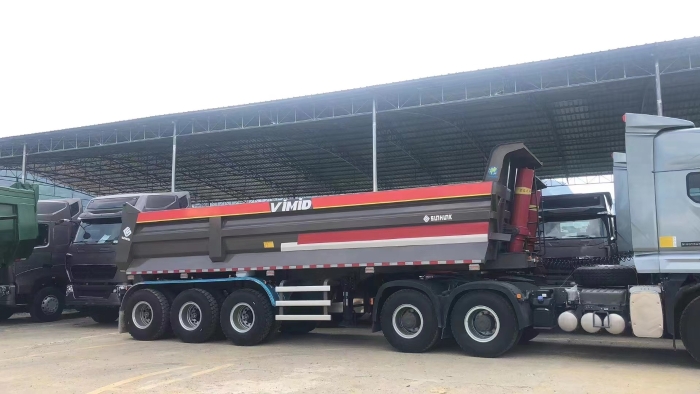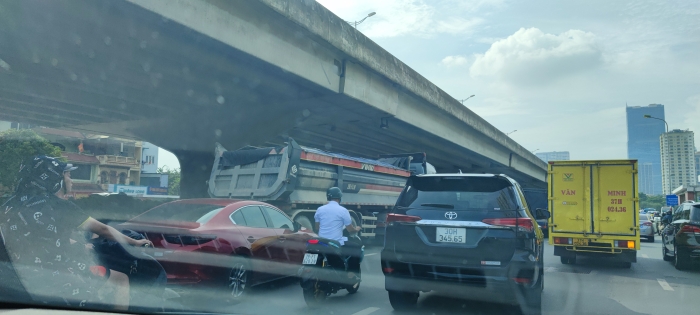- PRODUCTS
- SOLUTION
- SERVICE
- NEWS
- ABOUT US
Yes, custom semi-trailers can be specifically tailored to meet diverse transport needs, offering customizable designs, materials, and technologies.
Custom semi-trailers are specialized vehicles designed to meet unique transport requirements. These trailers are tailored to carry specific goods, from perishable items to heavy machinery, ensuring safety and efficiency. Their versatility makes them indispensable across various sectors, including agriculture, construction, and pharmaceuticals.
· Refrigerated Trailers: Ideal for transporting perishable goods that require temperature control, such as food and pharmaceuticals.
· Flatbed Trailers: Suitable for heavy or oversized loads like machinery, steel beams, and construction materials.
· Lowboy Trailers: Designed for hauling heavy equipment such as bulldozers and industrial machinery, with a low center of gravity to handle high weights.
· Tanker Trailers: Used for liquid goods, including chemicals, fuels, and water, featuring specialized tanks to prevent spillage.

· Perishable Goods: Require refrigerated trailers with precise temperature control to prevent spoilage.
· Heavy Equipment: Necessitate lowboy or flatbed trailers capable of supporting weights ranging from 20,000 to 120,000 pounds.
· Liquid Chemicals: Demand tanker trailers with chemical-resistant lining and secure seals to prevent leaks and contamination.
· Volume and Weight: The cargo's volume and weight dictate the trailer type. Flatbed trailers accommodate up to 48,000 pounds, whereas specialized heavy haulers can manage up to 120,000 pounds or more.
· Special Storage Needs: Items like pharmaceuticals require refrigerated trailers capable of maintaining temperatures between 2°C to 8°C, with advanced features for humidity and vibration control to ensure product integrity.
The ability to customize these trailers allows for optimal performance, meeting the precise needs of each shipment. From the meticulous design of refrigerated units to the robust construction of flatbeds, each trailer type plays a pivotal role in the efficient transport of goods, underscoring the importance of understanding customer needs to facilitate seamless and safe transportation solutions.
For more information on the specifications and applications of custom semi-trailers, refer to the respective Wikipedia entries on Refrigerated Trailers, Flatbed Trailers, Lowboy Trailers, and Tanker Trailers.
Custom semi-trailers cater to specific needs through tailored structural designs. For instance, enhanced suspension systems are critical for trailers transporting heavy or unevenly distributed loads, improving stability and safety. Special load protection features, such as customized tie-down points and load securing systems, ensure that goods remain intact and secure throughout transit.
Safety and ease of operation are paramount in the design of custom semi-trailers. Automatic loading systems reduce the risk of injury and improve efficiency, allowing for faster loading and unloading times.
The choice of materials significantly affects the performance of custom semi-trailers. High-strength steel is favored for its durability and load-bearing capacity, ideal for heavy-duty trailers. Aluminum alloys, on the other hand, offer a lightweight alternative, reducing fuel consumption and increasing payload capacity. The material selection directly influences the trailer's performance, longevity, and operational cost.
The incorporation of smart monitoring systems enhances safety and efficiency. These systems provide vital information on the trailer's condition and cargo, enabling proactive maintenance and management. Eco-friendly technologies aim to reduce emissions and improve fuel efficiency, aligning with global sustainability goals. Technologies such as aerodynamic designs and low-rolling-resistance tires are examples of how advanced engineering contributes to a more sustainable transport sector.
The intersection of innovative design and material science in custom semi-trailers showcases the industry's commitment to meeting diverse transport needs while prioritizing safety, efficiency, and environmental responsibility.
For further exploration of materials and technologies used in custom semi-trailers, please visit the Wikipedia pages on High-strength Steel and Aluminum Alloy, which provide comprehensive insights into their properties and applications.

During the customization of semi-trailers, customer involvement is paramount. Clients have the opportunity to participate in design reviews and material selection, ensuring that the final product meets their specific requirements. This collaborative approach allows for a tailored solution that precisely addresses the customer's needs.
· Design Review: Customers are engaged in evaluating the proposed designs, offering feedback to ensure the functionality and aesthetics align with their expectations.
· Material Selection: Clients choose from a variety of materials, such as high-strength steel or aluminum alloys, based on their performance impact and cost implications.
The customization process of semi-trailers involves several critical steps, each designed to ensure the final product meets the exact needs of the client.
1. Requirement Analysis: This initial phase involves understanding the customer's specific needs, including the type of cargo, weight capacity, and any special handling requirements.
2. Design: Based on the requirements analysis, a customized design is created, incorporating any specific features requested by the client.
3. Manufacturing: With the design approved, the manufacturing process begins, using the selected materials and incorporating any custom features.
4. Testing: The final step involves rigorous testing of the custom semi-trailer to ensure it meets safety standards and performs as expected under various conditions.
For more detailed insights into the materials and technologies used in the production of custom semi-trailers, please refer to the Wikipedia entries on High-strength Steel and Aluminum Alloys.
The cost of custom semi-trailers encompasses several key components, each contributing to the overall investment required to tailor a trailer to specific needs.
· Design Fees: The complexity of the design and the extent of customization directly impact the cost. Special features, such as enhanced suspension systems or specific load protection mechanisms, require additional engineering efforts.
· Material Costs: The choice of materials affects both the performance and cost. High-strength steel offers durability but at a higher price point compared to standard materials. Aluminum alloys, while lighter and potentially increasing fuel efficiency, also come with a premium.
· Technology Applications: Integrating advanced technologies, such as smart monitoring systems or automated loading mechanisms, increases initial costs but can offer long-term savings through improved efficiency and safety.
· Maintenance Expenses: Regular maintenance, including inspections and part replacements, is crucial for ensuring the longevity and safety of the trailer. Custom semi-trailers may have higher or specialized maintenance requirements.
· Transport Efficiency: Custom features designed to meet specific transport needs can significantly enhance operational efficiency, reducing overall transportation costs.
· Durability: High-quality materials and construction techniques extend the service life of the trailer, offering better long-term value despite the higher initial investment.

Maintaining a custom semi-trailer involves routine checks and servicing to ensure optimal performance and safety.
· Regular Inspections: Scheduled inspections are necessary to identify and address potential issues early, preventing costly repairs down the line.
· Part Replacement: The use of custom or high-performance parts may affect the frequency and cost of replacements, emphasizing the need for quality after-sales support.
Effective after-sales service and technical support are critical for maximizing the lifespan and efficiency of custom semi-trailers.
· Technical Support: Access to expert advice and assistance can help resolve issues more quickly, minimizing downtime.
· After-Sales Service: Quality service ensures that maintenance and repair work is performed to high standards, extending the operational life of the trailer.
Custom semi-trailers represent a significant investment, but with careful consideration of cost factors, maintenance, and service requirements, they can offer substantial long-term benefits. The ability to tailor every aspect of the trailer to specific transport needs not only enhances operational efficiency but also contributes to cost savings over time, making it a worthwhile investment for businesses looking to optimize their logistics operations.
For additional information on maintaining transportation equipment and understanding the impact of materials on performance, consider exploring Wikipedia entries related to Vehicle Maintenance and Material Science.